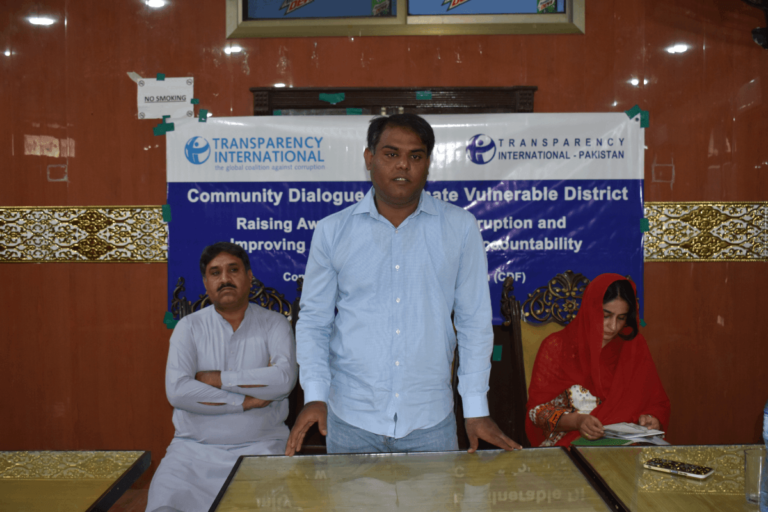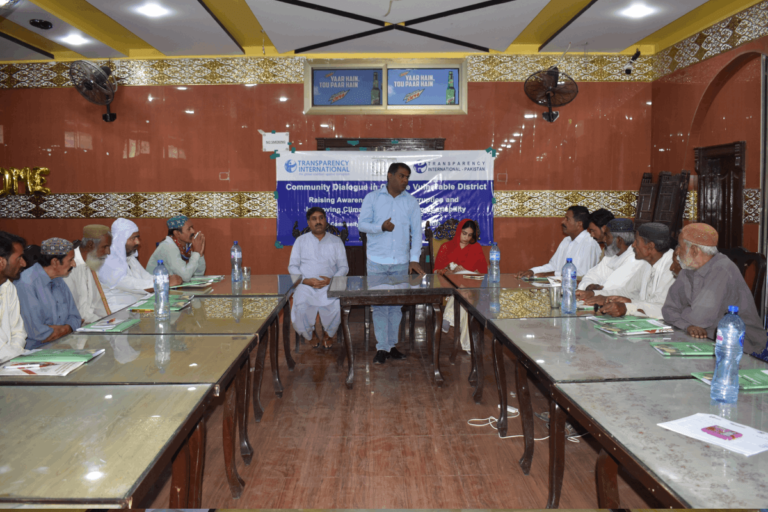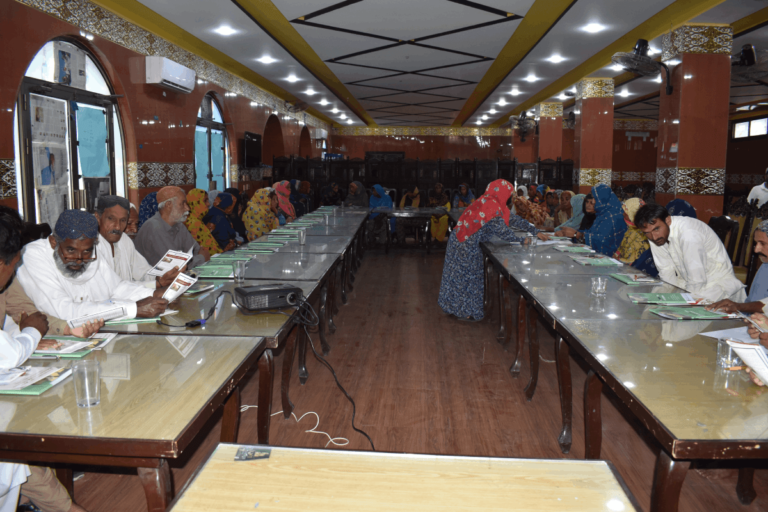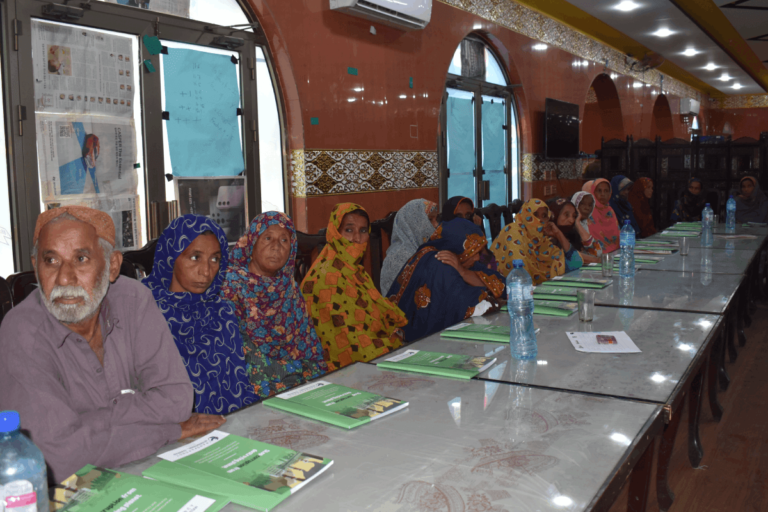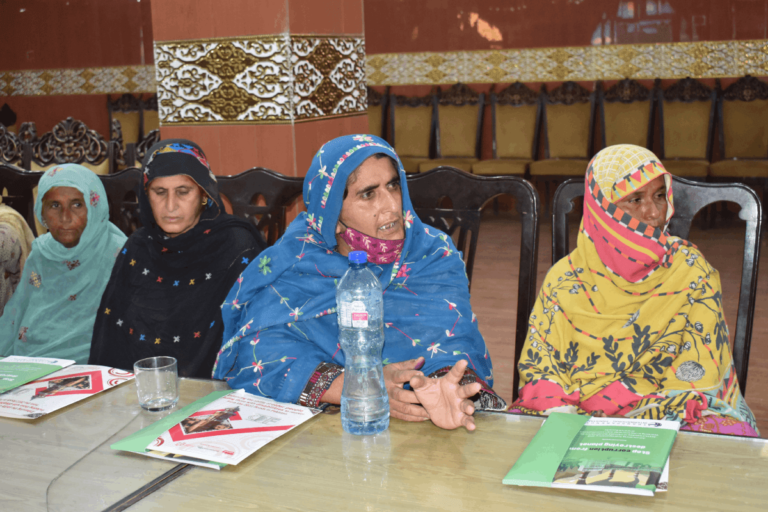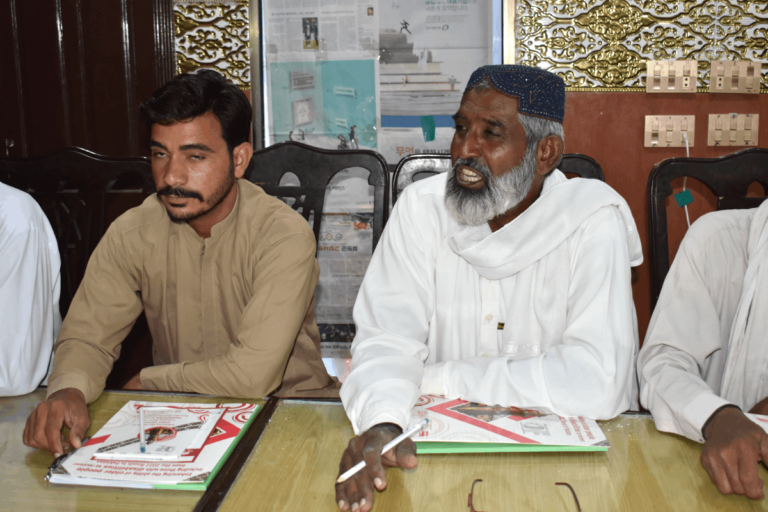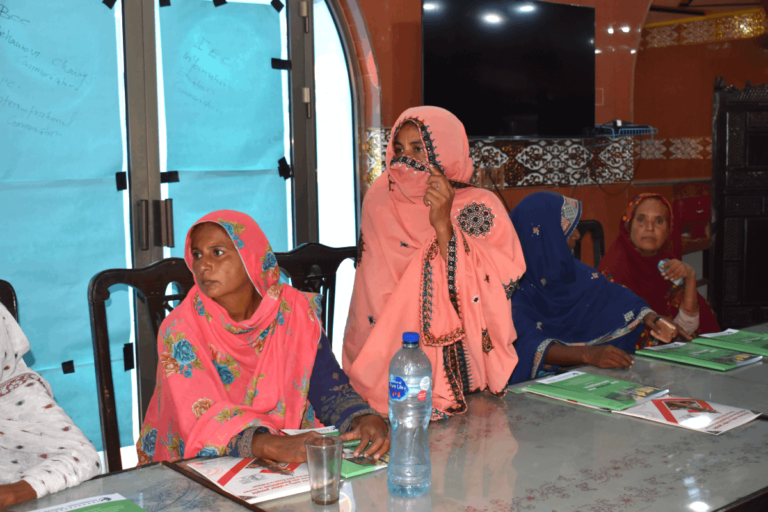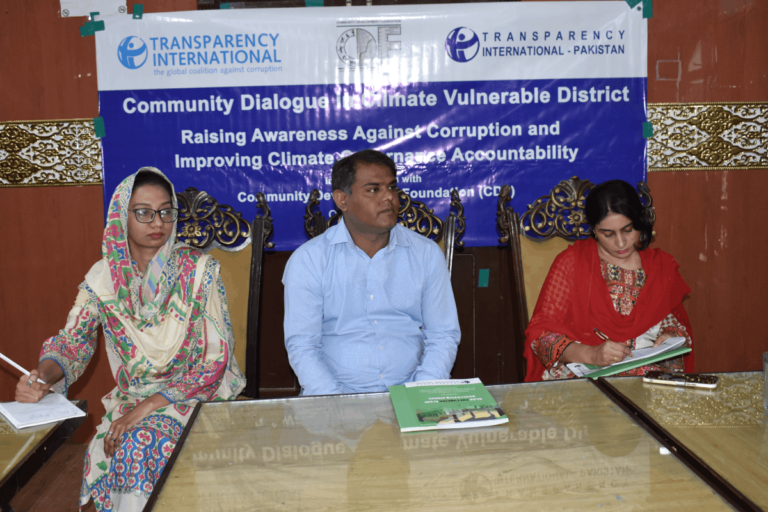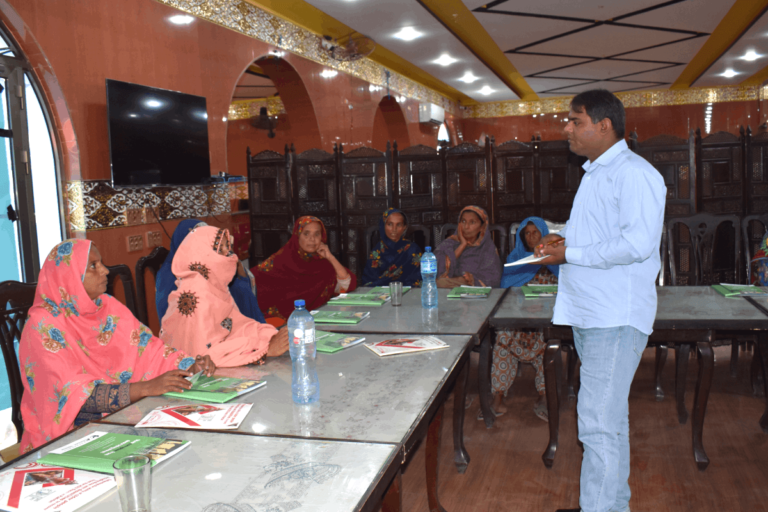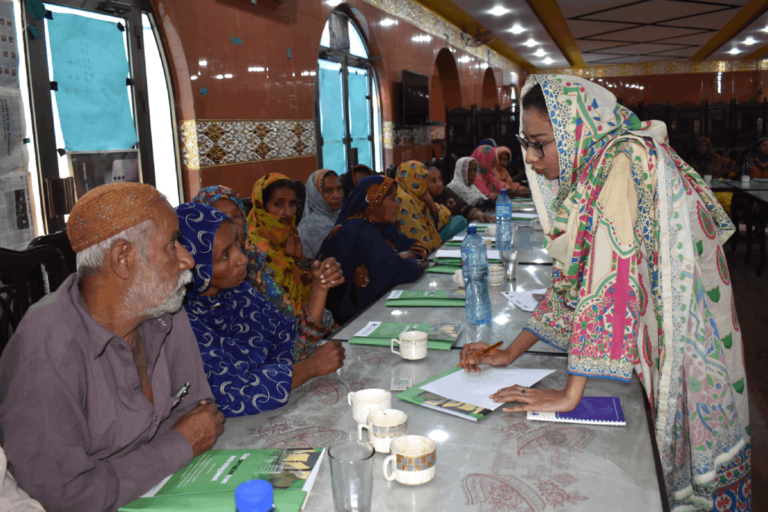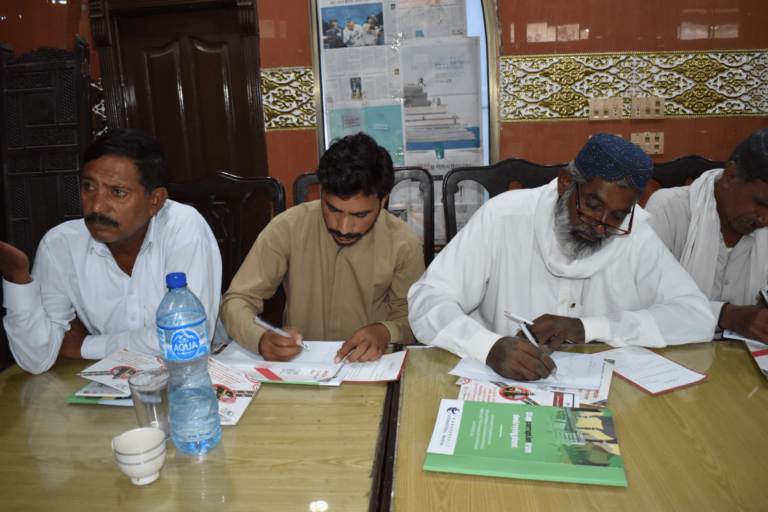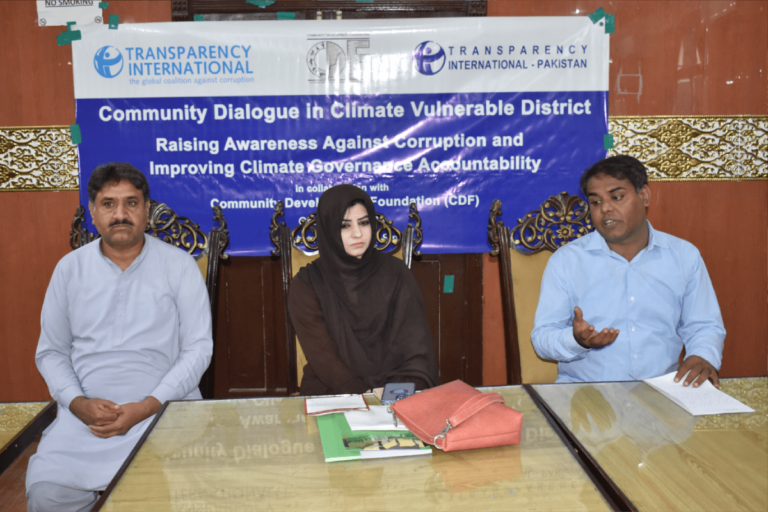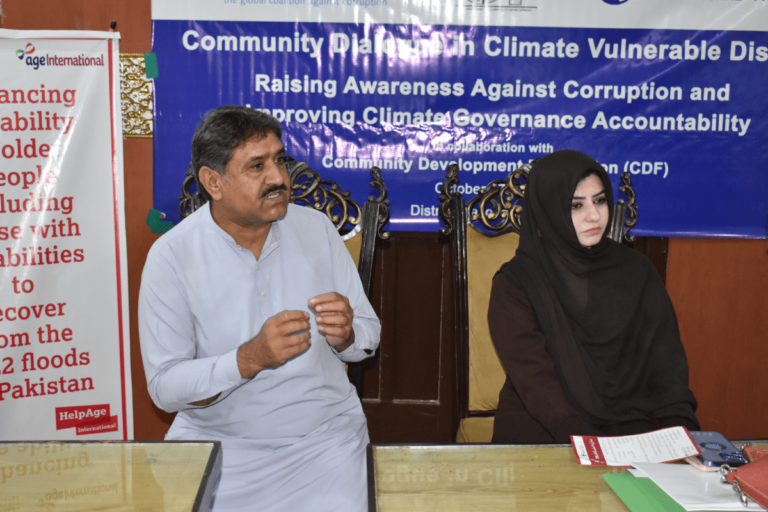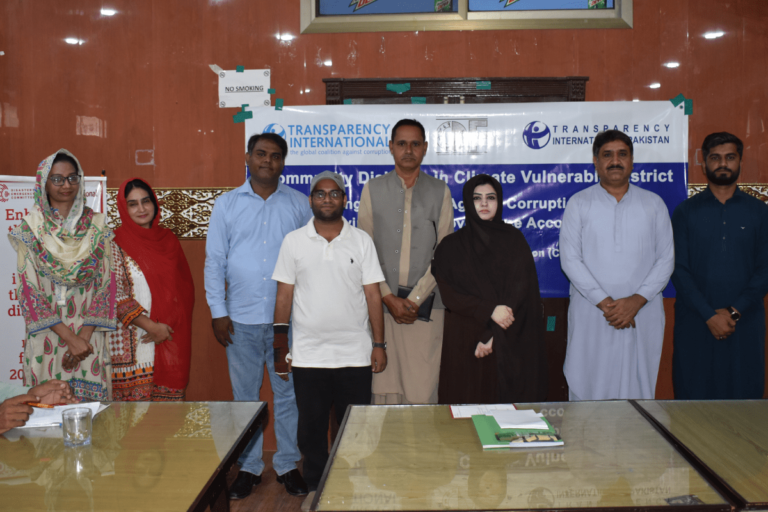- Home
- Community Dialogue in Climate Vulnerable District: Raising Awareness Against Corruption and Improving Climate Governance Accountability District Jacobabad, Sindh
Community Dialogue in Climate Vulnerable District: Raising Awareness Against Corruption and Improving Climate Governance Accountability District Jacobabad, Sindh
Community Dialogue in Climate Vulnerable District: Raising Awareness Against Corruption and Improving Climate Governance Accountability
Venue: District Jacobabad, Sindh
Date: Tuesday, 17 October 2023
Transparency Intentional Pakistan organized a Community Dialogue in climate vulnerable district to raise awareness against environmental corruption among the marginalized communities to enhance citizen’s participation in climate decision-making and planning. The open dialogue took place on 17th October 2023 at District Jacobabad, Sindh. Around 47 participants belonging to different communities and affected tehsils from District Jacobabad attended the dialogue. The community dialogue was also attended by the representatives of the district administration.
The dialogue formally started with the recitation of the Holy Quran. After which a round of introduction was carried out by Mr. Muhammad Jan Odhando, CEO of Community Development Foundation (CDF). He welcomed the participants and emphasized the significance of community participation in advocating for enhanced climate governance at provincial and local level.
Afterwards, Mr. Toufique Wassan, Project Coordinator, Tl Pakistan gave an overview of TI Pakistan’ “Strengthening Integrity and Inclusiveness in Climate Governance in Pakistan” program and emphasized that the aim of the community dialogue is to involve communities in calamity-hit and climate vulnerable districts, equipping them with the tools for social accountability to monitor and report environmental misconduct, increasing their knowledge of provincial climate policies, and demonstrating how women, youth, local, and marginalized communities can actively participate in climate planning.
He discussed in detail how Sindh’s climate policy ensures community participation in climate decision making and identified gaps which need improvement. He said that the Sindh Climate Change Policy 2022 is committed to implementing gender-sensitive initiatives that involve women in community organizations, enhance their access to essential resources, empower them to take part in decision-making, and provide them with comprehensive information on climate change and coping strategies.
He pointed out that the policy’s objective is to reinforce community-based disaster preparedness and mitigation programs, with the ultimate goal of establishing a climate-resilient society and prioritizing disaster risk reduction at the local level. He stressed that community participation is vital for tailoring climate impact solutions to meet the unique needs and vulnerabilities of the community. However, there are several gaps in terms of policy implementation which decrease the effectiveness of policy, hence delaying the climate action.
Mr. Wassan also highlighted the significance of establishing vigilance committees that can ensure an effective and efficient implementation of climate related projects with the consultation of youth, women, persons with disabilities and transgender communities in district Jacobabad.
Following that, Ms. Fariha Fatima, Assistant Project Coordinator, Transparency International Pakistan, conducted a session on impacts of climate change and gendered vulnerability. She said that according to UN, women are 14 times more likely to die during a natural disaster than men. 70% of the world population living in conditions of poverty are women which can be worsen due to effects of climate change. In disasters women face issues like displacement from their native place to relief camps where they do not have minimum facilities to survive with their children and family.
She explained how climate change hit women differently than men. Women suffer with harassment and domestic violence during and after disasters. They do not have access to clean water, safe toilets and medical facilities, and education during the disasters. Research conducted by Oxfam shows that during an emergency, woman have only 40 to 45% chance to have access to clean water, while men have more than 55% chance. Women have limited access to and control of environmental goods and services, they have negligible participation in decision-making, and are not involved in the distribution of environment management benefits. Consequently, women are less able to confront climate change.
Afterwards, participants were invited for an interactive and experience sharing discussion on situation during 2022 floods which caused heavy damages as well as lose of livelihood, agricultural crops and to share experiences of humanitarian assistance received from provincial and federal government.
A female participant, Noor Jehan Bibi shared her ordeal that she was living with her 4 children after her husband’s demise and was raising her children by a minimum earning from stitching clothes. But during the floods her all belongings washed away. She said she had to live in submerged house for months and the water is drained, but her house is still broken and she doesn’t have enough money to rebuilt her house.
Another participant, Abdul Nabi said that the only breadwinner in his house was his son who died from liver failure and now they are dependent on charity and donations from NGOS and government.
Ms. Maryam Khatoon, a community member said that she registered herself for Benazir Income Support Programme but she received only one instalment. She also received a relief cheque after floods and she opened a bank account for it but she hasn’t received money yet. She said that she has lost all her livestock during floods and now her son has to go in different cities for labor work.
Many of the community members said that they were given amount from Sindh Rural Support Program for rebuilding their houses and they had to share half of the amount, but they have suffered immense economic loss that they cannot afford to share money for building their houses.
Afterwards, Ms. Safia Manzoor, Assistant Director, Social Welfare Department, Jacobabad addressed the queries of community participants. She discussed the institutional response during disasters and talked about the efforts of rehabilitation after floods in the district. She said that more than 24 thousand houses were damaged in Jacobabad district while locals have lost 15,680 livestock and government is putting its best efforts to compensate this damage. She also assured that their complaints about Benazir Income Support Programme will be addressed as soon as possible.
Moving on, Mr. Wassan provided an overview of Advocacy and Legal Advice Centre of TI Pakistan. He said TI Pakistan consistently promotes community involvement in detecting and reporting corrupt activities at the grassroots level, directing them to the Advocacy and Legal Advice Centre. The organization routinely communicates with pertinent authorities to bring attention to and address citizen complaints.
He also emphasized the urgent requirement to educate local communities on climate change mitigation, adaptation, resilience, and social accountability tools, with the aim of boosting their active engagement in climate-related decision-making and equipping them with the capabilities to identify and report environmental misconduct. One of the social accountability tools effective for engagement in climate planning and decision making is Sindh Transparency and Right to Information Act 2016. He provided the community members with information on how to complete RTI (requests to obtain details regarding climate projects and decisions. He informed the participants that every citizen possesses the right to access public information through RTI. He offered a concise overview of the RTI application procedure and the roles and duties of the Sindh Information Commission.
In the end, participants wrote RTI applications to different departments. TI Pakistan will review RTI applications and submit to the relevant departments on behalf of the citizens.
In the end, Mr. Muhammad Jan Odhando, CEO of Community Development Foundation (CDF) concluded the dialogue by thanking TI Pakistan, district administration and the participants from different communities for their participation in the community dialogue on climate change.


